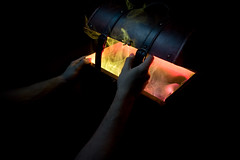Do you ever stop to think about what various cultures value in their stories? Honestly, I haven't read widely enough to draw more than the most tentative conclusions, but I think it's pretty obvious what Americans hold dear in their narratives—novelty. How did the Hollywood revival of Shakespeare on the big screen get started in the nineties? Not with finely nuanced performances, but rather by having Aussie auteur Baz Luhrmann slip handguns and hyperactive cinematography into Romeo + Juliet. Literary types certainly go in for Shiny New Things, and I suspect that most honest readers of James Joyce's Ulysses will admit that the novel owes its place at the peak of the academy's most ivory tower more to its wildly experimental style than its rather simple themes. (Fun fact: Joyce's magnum opus contains depictions every fluid that the human body can produce!) And genre fans are by no means immune to the allure of the unique and original. I couldn't help but be reminded of that as I read the back-cover blurbs for M.R. Carey's The Girl With All the Gifts. "Original, thrilling and powerful." "As fresh as it is terrifying." "The most original thriller you will read this year." All of this is rather funny, because while The Girl With All the Gifts is many things—most of them good—it's anything but original.
Melanie likes school. She likes learning about math and science, history and literature, myth and religion. She likes how she always does well in evaluations, usually scoring better than anyone else in her class. Most of all, she likes Miss Justineau, the pretty teacher who always gives her students extra attention, always treats them like people. The same can't be said for Sergeant Parks and his men. Every day, they strap her into her wheelchair and cart her from her cell to the classroom. They unstrap an arm so she can write. Some days, they take her to the chemical showers. Then she gets wheeled back to her room. Cell, corridor, classroom—those are almost the entirety of Melanie's life. But one day scary Dr. Caldwell is going to call for Melanie, and she'll get to experience the wide world itself in a most unexpected way.
Okay, in that previous paragraph, I tried to mirror the tone of the dust jacket copy, which makes Melanie's predicament sound kind of mysterious. But if I were to simply mention a couple of titles—let's say, oh, 28 Days Later and The Last of Us—that mystery evaporates like mist struck by summer sun. Indeed, Carey basically "spoils" his own setup within the first three pages, which must've sent the marketing division into apoplectic fits. I imagine them murmuring, "How are we going to sell this thing if everyone knows from the onset it's a retread of horror tropes?" Well, they might've started with Carey's masterful use of language, the way he blends literary style with genre action. When a grenade explodes, "the peristaltic shudder of the shockwave" rocks nearby combatants. After fighting off a fungal monster with a shard of broken glass that flays her palms to ribbons, a desperate researcher "rummages in her pockets, leaving dark red Bézier curves of blood on her white lab coat." While saving Miss Justineau from an assailant, Melanie "sensed the artery singing to her through folds of flesh and fabric." Yeah, Carey can write. He also has a masterful command of myth, turning the story of Pandora (which literally translates into the novel's title) into a tale both bleak and heartening. Though you can see the ending coming for the last few chapters, the lack of surprise does nothing to lessen its piercing pathos. There are truly greater virtues than novelty.
(Picture: CC 2009 by Michael Hensmann)
Thursday, January 21, 2016
Subscribe to:
Post Comments (Atom)



No comments:
Post a Comment